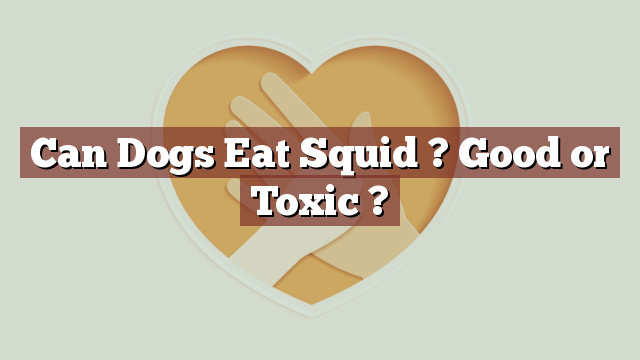Can Dogs Eat Squid? Good or Toxic?
As responsible pet owners, it is essential to be aware of what foods are safe for our furry friends. With so many different types of food available, it’s important to know if certain foods, like squid, are suitable for dogs. In this article, we will explore whether dogs can eat squid and discuss the potential risks and benefits associated with it.
Nutritional Value of Squid: Protein-rich and packed with essential nutrients.
Squid is a seafood delicacy enjoyed by many humans due to its unique taste and texture. From a nutritional standpoint, squid is rich in protein and packed with essential nutrients. It contains vitamins such as vitamin B12, vitamin B6, and vitamin E. Additionally, it is a good source of minerals like zinc, selenium, and copper. The high protein content in squid makes it a valuable addition to a balanced diet.
Can Dogs Eat Squid? Yes, but with caution: Risks and toxic effects.
While squid may offer nutritional benefits, it is important to exercise caution when considering feeding it to dogs. Squid itself is not inherently toxic to dogs, but certain factors need to be taken into account. Firstly, it is crucial to ensure that the squid is cooked thoroughly before offering it to your furry friend. Raw or undercooked squid can harbor bacteria or parasites that may cause digestive issues or infections.
Furthermore, some dogs may have allergic reactions to seafood. If your dog has not been exposed to squid or any other seafood before, it is advisable to introduce it gradually and monitor for any signs of allergic reactions. These may include itching, redness, swelling, or gastrointestinal disturbances. If any of these symptoms occur, it is best to discontinue feeding squid and consult a veterinarian.
Potential Risks or Benefits: Allergies, choking hazards, and mercury concerns.
In addition to potential allergies or sensitivities, there are other risks associated with feeding squid to dogs. One concern is the possibility of choking. Squid can have a rubbery texture, which may make it difficult for some dogs to chew and swallow properly. To minimize this risk, it is recommended to cut the squid into small, bite-sized pieces or cook it until it is softer and easier to chew.
Another consideration is the potential presence of mercury in seafood, including squid. Mercury is a heavy metal that can accumulate in the bodies of marine animals. While the levels of mercury in squid are generally considered to be low, it is advisable to feed it to your dog in moderation. High levels of mercury can be harmful to dogs over time, affecting their nervous system and overall health.
What to Do if Your Dog Eats Squid: Observe for symptoms and seek veterinary advice.
If your dog has managed to sneak a bite of squid without your knowledge, it is important to observe them for any adverse reactions or symptoms. Monitor their behavior, appetite, and stool consistency for any changes. If you notice any signs of discomfort, digestive upset, or allergic reactions, it is recommended to consult a veterinarian promptly. They will be able to provide you with appropriate advice and guidance based on your dog’s specific situation.
Conclusion: Squid can be a treat, but moderation and safety precautions are key.
In conclusion, dogs can eat squid, but it must be done with caution. Squid provides nutritional benefits such as protein and essential vitamins and minerals. However, it is important to ensure that the squid is cooked thoroughly to eliminate any potential bacteria or parasites. Additionally, some dogs may have allergies or sensitivities to seafood, so careful monitoring is necessary when introducing squid into their diet. Choking hazards and the presence of mercury are also concerns that should be taken into account. As with any new food, moderation is key, and if any adverse reactions occur, it is best to consult a veterinarian for guidance.
Thank you for investing your time in exploring [page_title] on Can-Eat.org. Our goal is to provide readers like you with thorough and reliable information about various dietary topics. Each article, including [page_title], stems from diligent research and a passion for understanding the nuances of our food choices. We believe that knowledge is a vital step towards making informed and healthy decisions. However, while "[page_title]" sheds light on its specific topic, it's crucial to remember that everyone's body reacts differently to foods and dietary changes. What might be beneficial for one person could have different effects on another. Before you consider integrating suggestions or insights from "[page_title]" into your diet, it's always wise to consult with a nutritionist or healthcare professional. Their specialized knowledge ensures that you're making choices best suited to your individual health needs. As you navigate [page_title], be mindful of potential allergies, intolerances, or unique dietary requirements you may have. No singular article can capture the vast diversity of human health, and individualized guidance is invaluable. The content provided in [page_title] serves as a general guide. It is not, by any means, a substitute for personalized medical or nutritional advice. Your health should always be the top priority, and professional guidance is the best path forward. In your journey towards a balanced and nutritious lifestyle, we hope that [page_title] serves as a helpful stepping stone. Remember, informed decisions lead to healthier outcomes. Thank you for trusting Can-Eat.org. Continue exploring, learning, and prioritizing your health. Cheers to a well-informed and healthier future!

